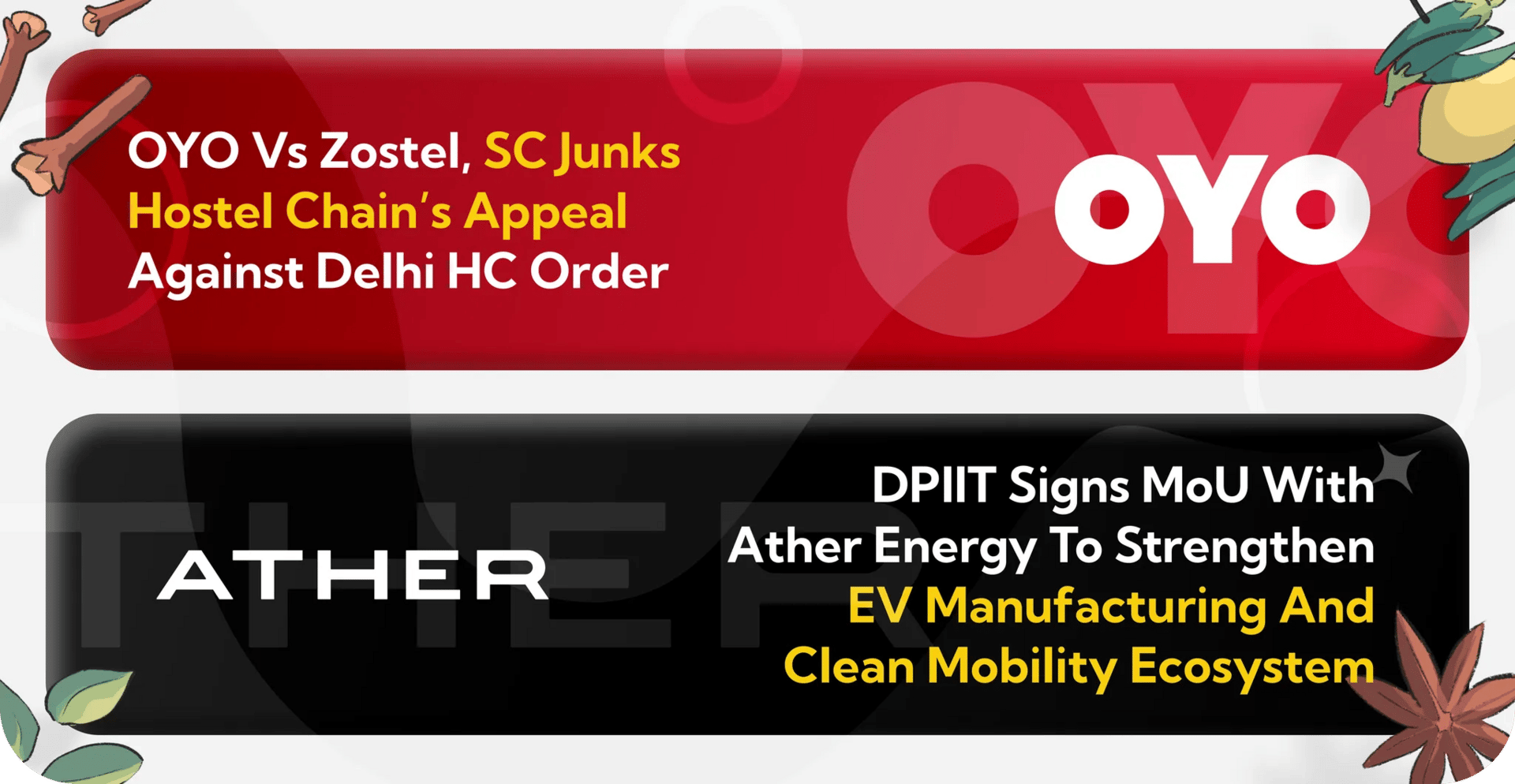- Startup Chai
- Posts
- Eggoz's Growth, OYO Vs Zostel, and Plugzmart’s “Relay”
Eggoz's Growth, OYO Vs Zostel, and Plugzmart’s “Relay”
Plus DPIIT Signs MoU and fundraising news about Vahan.ai, SpeakX, Littlebox, and others

A few years ago, the idea of paying a premium for eggs might have seemed laughable. Today, thanks to brands like Eggoz, a new breed of Indian consumers — urban, health-conscious, and brand-sensitive — are willingly shelling out ₹8-₹12 for an “orange-yolked, hygienically packed, UV-sanitized” egg. And this isn’t just a niche phenomenon anymore. Eggoz is now clocking over ₹130 crore in revenue for FY25, up from ₹54.7 crore in FY23, and has hit EBITDA breakeven.
Behind this surge is a classic D2C playbook - one that India’s FMCG landscape has seen time and again, but which rarely cracks the code in something as commoditized as eggs. It starts with a visible problem: India is the world’s second-largest egg consumer, but only 5% of the ₹1 lakh crore egg market is organized. Eggs are sold loose, unpackaged, with no traceability, and zero brand recall. Eggoz entered this chaos and introduced packaging, storytelling, influencer-led marketing, and digital-first distribution. Suddenly, eggs became brandable.
But branding in such a commodity category doesn’t come cheap. Eggoz has raised over raised a total of $37.8 million in funding across 10 funding rounds, including a $20 million Series C round in 2025. Most of that capital has gone into narrative-building across gyms, RWAs, Instagram reels, YouTube campaigns, and sampling drives in co-working spaces and supermarkets. Their tagline “Orange Yolk = Better Nutrition” and campaigns like “Anda Ho To Aisa” were key to building their brand and establishing a strong narrative that challenged how consumers traditionally viewed eggs.
The startup’s business model is also optimized for scalability. They began by owning poultry farms and focusing on operational control, with a 100% herbal feed and over 100,000 chickens by 2020. But the pandemic forced a shift to an asset-light, tech-enabled D2C model enabling them to focus on what it really sells - perception, consistency, and trust.
And it seems to be working, at least for now.
Eggoz has mastered the early stages of D2C growth - blitz marketing and utilizing investor networks for Q-commerce tie-ups as well as visibility in modern retail. Their eggs reach shelves within 1-2 days of being laid. But beneath this visible success is a critical reality: their biggest moat isn’t freshness, technology, or even quality - it’s brand recall. Because at the end of the day, an egg is still just an egg.
This means Eggoz’s long-term prospects are tied to how deeply it can embed itself into consumer psyche. Because the logistics moat has evaporated. Sourcing and last-mile delivery can now be outsourced with ease. And while Eggoz may have had a head-start, a new player with a bigger cheque and deeper pockets can replicate the entire model. After all, eggs don’t require R&D or patents. The real challenge will begin when a Reliance Fresh or an ITC decides to go after the same segment with more money and deeper distribution.
There’s also the question of differentiation. Most of Eggoz’s value proposition is built around visual and emotional appeal - orange yolk, sanitized shells, branded boxes. But independent studies still debate whether these eggs offer any materially superior nutrition compared to what’s available at your local kirana. That doesn’t make Eggoz’s story any less impressive - but it does show how fragile premiumization can be when it’s perception-led.
From an investor lens, though, this play is still very much on track. In many ways, Eggoz’s journey mirrors the trajectory of other D2C winners in India - plenty of burn upfront, narrative-driven growth, asset-light backend, and a well-defined path toward strategic acquisition. If a protein-focused FMCG major like Godrej or ITC wants to plug an “egg” gap in its portfolio, Eggoz offers ready distribution, strong recall, and the beginnings of a national brand. That’s a neat exit story for early VCs.
But time is of the essence, and brand loyalty in this category is shallow. The moment Eggoz slows on consumer marketing or fails to innovate (perhaps with RTE formats, protein snack packs, or high-functionality eggs), the edge dulls. That’s the paradox of D2C in India: you sprint until someone with more money joins the race.
Eggoz has built a promising brand and created a defensible wedge in an unorganized sector. But whether that wedge turns into a moat - or is washed away by the next wave of capital - is still a yolk in progress.
Let’s go through what else is happening in Indian startup world - Grab your simmering cup of StartupChai.in and unwind with our hand-brewed memes.

“Ladke Kya Faayda Hai Beta”: OYO Vs Zostel, SC Junks Hostel Chain’s Appeal Against Delhi HC Order
The Supreme Court just shut the door on Zostel’s latest move against OYO, saying they knocked on the wrong legal door.
Instead of filing an appeal under Section 37, Zostel jumped straight to the apex court with a Special Leave Petition - and got turned away. With this, a decade-long hostel drama that began in 2015 over a non-binding term sheet keeps circling in legal limbo.
Read more here

“Janmo Ke Saathi”: DPIIT signs MoU with Ather Energy to strengthen EV manufacturing and clean mobility ecosystem
In a move that amps up India’s EV game, DPIIT has plugged into Ather Energy with a fresh MoU to boost clean mobility and homegrown manufacturing.
This alliance, part of the Build in Bharat push by the Startup Policy Forum, brings over 50 innovation-first startups into the fold.
Read more here


“Suswagatam Suswagatam”: BHIVE workspace appoints former Smartworks Projects Head Esha Ranjan as Chief Projects Officer
BHIVE Workspace just brought Esha Ranjan on board as Chief Projects Officer, marking a key power move in its growth journey.
With an IPO planned for 2026, this hire signals BHIVE’s sharpened focus on operational muscle and scaling smart. Think of it as setting the stage, suitably premium, for the big market debut ahead.
Read more here

“Play The Pipes Of Peace”: IIT Madras-incubated Firm Plugzmart develops indigenous EV charging platform designed to connect chargers with multiple networks
Say goodbye to one-app EV charging as IIT Madras-incubated Plugzmart has launched “Relay,” a smart platform that lets a single charger connect to multiple networks at once.
It’s like giving EV chargers a social life, no more being locked into one ecosystem, just smooth, app-agnostic plug-and-play across platforms.
Read more here

Vahan.ai has secured undisclosed funding from Temasek’s LemmaTree and snapped up L.earn to blend skilling with blue-collar job placements. As GoodWorker winds down, Vahan gears up to scale from 40K to 1L monthly hires.
Read more hereSpeakX has kicked off its $11 Mn pre-Series B with ₹26.24 Cr from Elevation Capital, joined by WestBridge Capital and other marquee angels. Backers include Charles Songhurst, Ashish Jain, and Siddharth Kohli.
Read more hereFast fashion D2C brand Littlebox has raised ₹17.5 Cr in seed funding co-led by Huddle Ventures and Prath Ventures. With fresh capital in hand, the husband-wife-led startup is eyeing the ₹100 Cr revenue milestone.
Read more hereW Health Ventures has launched a $70 Mn Fund II to back 8–10 early-stage healthtech startups, with a sharp focus on oncology, psychiatry, and elder care. Average cheque sizes will range from $3-5 Mn, with the first close expected in the coming months
Read more hereAI-native software delivery startup Heizen has raised $500K in pre-seed funding from Titan Capital and top angels like Varun Alagh and Abhishek Goyal. The goal: shake up legacy IT services with a fresh, AI-first approach.
Read more hereWah! Puchka Wah! Litti has raised $230K from Wow! Momo’s Sagar Daryani and other global angels to revamp India’s street food scene. The founder Deepak Kumar is blending hygiene with heritage to scale puchkas and littis nationwide.
Read more hereIPO-bound Zetwerk is set to raise ₹600 Cr from its co-founders via newly formed Creovate Innovation, ahead of its public debut. The capital infusion involves issuing 6.46 Cr preference shares, with both founders investing equally.
Read more hereFlexprice has bagged $500K in pre-seed funding from TDV Partners and top operators to scale its open-source billing platform for the AI-first economy. The startup aims to become the go-to metering backbone for agentic and AI-native companies.
Read more here
How did today's serving of StartupChai fare on your taste buds? |